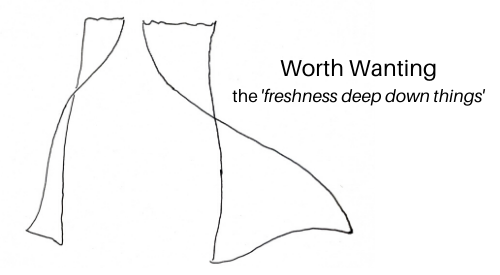
The trickster character common in world mythology has its counterpart in that kind of person who is today deliberately shaking the institutions of our civilization, perhaps to reveal weaknesses, perhaps to wreak destruction.
Let’s think about Loki of the Norse tradition, a complex character, on one hand, a helpful fixer for the gods, ready to resort to underhanded means to make things turn out well for his clients (in dire situations he himself often created), and on the other, an unashamed and inveterate troublemaker always looking for ways to subvert whatever order there is and discredit whatever is good. Some of the adjectives used to describe him: moody, cunning, teasing, sly, irreverent, fearless, malicious. unreliable, nihilistic. This is the character who shows up at the Ragnarok, the last battle of giants against gods, on the side of the forces of chaos.
Gods, and people, get into enough trouble on their own without having a Loki around, but a Loki-kind of probing and testing can serve a positive function. “Is this really as good as it looks?” “Do you really mean what you say?” “What exactly happened?” These are the questions we sometime dread and struggle answering but have to in order to stay true to the truth.
Asked in good faith, these are quality control questions, and very necessary, given our biases and tendency to self-deception. It is the work of the astute critic, the penetrating analyst, the relentless investigator, the assiduous friend, to follow the somewhat circuitous routes required to get to the heart of a case. May we think of this resourceful persistence as a eu-Loki trait?
But our current concern are the Mal-Lokis who are not interested in preservation or improvement but in havoc and humiliation. The order of the gods or of western civilization can go hang, as far as they are concerned. How do we reduce the number and protect against the predations of this growing tribe?
If civilization is an institution of institutions as I argue in another post Civilization Shake Up, then the question is how we protect individual institutions and the ecosystem of interactive, interdependent institutions they are a part of.
Institutions as organizations, can, of course, be threatened externally, by individuals agents or other institutions. They can be harassed, decapitated, banned, corrupted, exploited, starved, weaponized. Rules can be abolished; practices prohibited, communities intimidated, leaders locked up.
Resistance in such cases is well- warranted, indeed an obligation if the institution is worth preserving. This may mean a fight, but it’s fight worth risking. One consequence: resources may be allocated to reacting to assault which might otherwise go to cultivation of the health of the value system the institution proclaims and protects. And the eye of the institution may be primarily directly outward in a combative mode. However, Mal-Lokis arise internally and work within institutions to subvert them. How can we respond proactively.
Institutions work by creating freedom spaces within boundaries defined by systems of constraint which determine the kind of space and its limits. Within such a space, what is not forbidden by the constraints is allowed. In such a space, trust flourishes. This trust depends, this is important, on the integrity of the constraint system, and flaws in that can seed Mal-Loki mentality.
One way to make sure an institution is well-prepared for the exigencies of life is to make sure the constraint system is honest, universal and coherent. Too many loopholes, too many conflicting restrictions, too little enforcement and constituents won’t be able to make use of the freedom the system was supposed to provide. Disappointment and indignation is appropriate if they activate change, but these feelings can turn into a scorn of the constraint system itself. Such scornfulness can be the first step to a Mal-Loki mindset.
Next is to subvert the commons of trust that makes an institution work, and to cynically exploit its shared resources for private benefit or on behalf of some other institution. It’s easy to feel disdain for those easy to manipulate, still gullible enough to believe in the institution or others. This sense of superiority can be the second step toward Mal-Loki-ness.
Finally, delight in destruction of all value systems as such. A value system is a deep and visceral apprehension of the way things are and work, and what is worth wanting, and the positive, preferable or perfect relationship of the two. As such it is a collective production and possession, just as the institution that embodies the value system is a community resource. A third step Mal-Loki mentality may find the compelling nature of values, the sharing of resources, and the necessary coordination of actions personally offensive and oppressive, and so, in resentment, attack the efforts of any people to build or maintain institutions to reflect any value system.
That said, however, the deepest source of the health of any institution is not in the coherence of its set of strictures, but in the vitality of the value system itself, which needs constant refreshment and renewal in the face of changing circumstances and constituent experiences. A healthy value system is able to keep an institution strong, quick to identify identify and sanction boundary breakers, able to maintain the active loyalty of its constituents, able to resist domination, but still confident enough to receive interesting input.
The way to refreshment and renewal of value systems is through regular encountering, because encounters are how we discover and rediscover what is worth wanting. Value system need not just adherence, but imagination and vision, and this comes to us not from the mundane, but from transcendent freshness active in our encounters.
Slowly or suddenly, smoothly or roughly, healthy institutions retain their relevance, their limberness and suppleness, their openness to what is, what may be, what is to come. their greenness. Encountering keep institutions fruitful.
I personally cannot approve of all institutions. Value systems speak to the persistent and compelling needs and wants of common humanity, but I can’t endorse all value systems. Nevertheless, I believe that regular encountering, openly championed within individual institutions and the ecosystem of institutions which constitute a civilization, allows freshness to actively renew any value system and its corresponding institution, and in renewal is hope.
